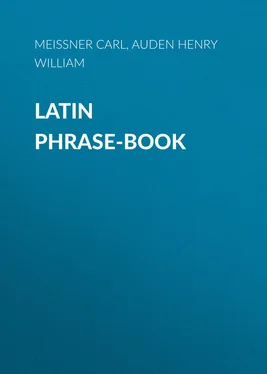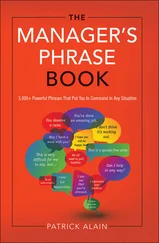Carl Meissner - Latin Phrase-Book
Здесь есть возможность читать онлайн «Carl Meissner - Latin Phrase-Book» — ознакомительный отрывок электронной книги совершенно бесплатно, а после прочтения отрывка купить полную версию. В некоторых случаях можно слушать аудио, скачать через торрент в формате fb2 и присутствует краткое содержание. Жанр: foreign_antique, foreign_prose, на латинском языке. Описание произведения, (предисловие) а так же отзывы посетителей доступны на портале библиотеки ЛибКат.
- Название:Latin Phrase-Book
- Автор:
- Жанр:
- Год:неизвестен
- ISBN:нет данных
- Рейтинг книги:5 / 5. Голосов: 1
-
Избранное:Добавить в избранное
- Отзывы:
-
Ваша оценка:
- 100
- 1
- 2
- 3
- 4
- 5
Latin Phrase-Book: краткое содержание, описание и аннотация
Предлагаем к чтению аннотацию, описание, краткое содержание или предисловие (зависит от того, что написал сам автор книги «Latin Phrase-Book»). Если вы не нашли необходимую информацию о книге — напишите в комментариях, мы постараемся отыскать её.
Latin Phrase-Book — читать онлайн ознакомительный отрывок
Ниже представлен текст книги, разбитый по страницам. Система сохранения места последней прочитанной страницы, позволяет с удобством читать онлайн бесплатно книгу «Latin Phrase-Book», без необходимости каждый раз заново искать на чём Вы остановились. Поставьте закладку, и сможете в любой момент перейти на страницу, на которой закончили чтение.
Интервал:
Закладка:
si vita suppetit – if I live till then.
quod reliquum est vitae – the rest of one's life.
vitae cursum or curriculum 46 46 vitae (vivendi) cursus or curriculum = life, career – considering its duration, length. Life = biography is not curriculum vitae , but simply vita, vitae descriptio .
conficere – to finish one's career.
Homerus fuit 47 47 To live, speaking chronologically, is esse ; vivere denotes to be alive, pass one's life, e.g. laute, in otio .
multis annis ante Romam conditam – Homer lived many years before the foundation of Rome.
3. Time of Life
(The terms for the different ages of man are infans, puer, adulescens, iuvenis, senior, senex, grandis natu .)
ea aetate, id aetatis esse – to be of such and such an age.
a puero (is), a parvo (is), a parvulo (is) – from youth up.
a teneris unguiculis (ἐξ ἁπαλων ὀνύχων) (Fam. 1. 6. 2) – from one's cradle, from one's earliest childhood.
ab ineunte (prima) aetate (De Or. 1. 21. 97) – from one's entry into civil life.
ex pueris excedere – to leave one's boyhood behind one, become a man.
flos aetatis – the prime of youthful vigour.
aetate florere, vigere – to be in the prime of life.
integra aetate esse – to be in the prime of life.
adulescentia deferbuit – the fires of youth have cooled.
aetate progrediente – with advancing years.
aetate ingravescente – with the weight, weakness of declining years.
aetas constans, media, firmata, corroborata (not virilis ) – manhood.
grandior factus – having reached man's estate.
corroborata, firmata aetate – having reached man's estate.
sui iuris factum esse – to have become independent, be no longer a minor.
aetate provectum esse (not aetate provecta ) – to be advanced in years.
longius aetate provectum esse – to be more advanced in years.
grandis natu – aged.
aetate affecta esse – to be infirm through old age.
vires consenescunt – to become old and feeble.
senectute, senio confectum esse – to be worn out by old age.
exacta aetate mori – to die at a good old age.
ad summam senectutem pervenire – to live to a very great age.
senectus nobis obrēpit – old age creeps on us insensibly.
admodum adulescens, senex – still quote a young (old) man.
extrema aetas – the last stage of life, one's last days.
extremum tempus aetatis – the last stage of life, one's last days.
vita occidens – the evening of life.
aequalem esse alicuius – to be a contemporary of a person.
maior (natu) – the elder aetate alicui antecedere, anteire – to be older than.
quot annos natus es? – how old are you?
qua aetate es? – how old are you?
tredecim annos natus sum – I am thirteen years old.
tertium decimum annum ago – I am in my thirteenth year.
puer decem annorum – a boy ten years old.
decimum aetatis annum ingredi – to be entering on one's tenth year.
decem annos vixisse – to be ten years old.
decimum annum excessisse, egressum esse – to be more than ten years old, to have entered on one's eleventh year.
minorem esse viginti annis – to be not yet twenty.
tum habebam decem annos – I was ten years old at the time.
centum annos complere – to reach one's hundredth year, to live to be a hundred.
vitam ad annum centesimum perducere – to reach one's hundredth year, to live to be a hundred.
accessio paucorum annorum – the addition of a few years.
tertiam iam aetatem videre – to be middle-aged ( i. e. between thirty and forty).
in aetatem alicuius, in annum incidere – to happen during a person's life, year of office.
omnium suorum or omnibus suis superstitem esse – to outlive, survive all one's kin.
homines qui nunc sunt (opp. qui tunc fuerunt ) – our contemporaries; men of our time.
homines huius aetatis, nostrae memoriae – our contemporaries; men of our time.
posteri – posterity.
scriptores aetate posteriores or inferiores – later writers.
4. Hunger – Thirst
esurire – to be hungry.
fame laborare, premi – to be tormented by hunger, to be starving.
famem tolerare, sustentare – to endure the pangs of hunger.
inediā mori or vitam finire – to starve oneself to death.
fame confici, perire, interire – to die of starvation.
fame necari – to be starved to death (as punishment).
famem, sitim explere – to allay one's hunger, thirst.
famem sitimque depellere cibo et potione – to allay one's hunger, thirst.
siti cruciari, premi – to suffer agonies of thirst.
sitim colligere – to become thirsty.
sitim haustu gelidae aquae sedare – to slake one's thirst by a draught of cold water.
famis et sitis 48 48 sitis is also used metaphorically – e.g. libertatis sitis (Rep. 1. 43. 66), so sitire – e.g. honores (De Fin. 4. 5. 3), libertatem (Rep. 1. 43. 66), sanguinem (Phil. 2. 7. 20). The participle sitiens takes the Gen. – e.g. sitiens virtutis (Planc. 5. 13).
patientem esse – to be able to endure hunger and thirst.
5. Laughter – Tears
risum edere, tollere 49 49 Not in risum erumpere , which only occurs in late Latin. However, risus, vox, fletus erumpit is classical, similarly indignatio (Liv. 4. 50), furor, cupiditates (Cael. 12. 28).
– to begin to laugh.
cachinnum tollere, edere – to burst into a roar of laughter.
risum movere, concitare – to raise a laugh.
risum elicere (more strongly excutere ) alicui – to make a person laugh.
risum captare – to try and raise a laugh.
risum tenere vix posse – to be scarcely able to restrain one's laughter.
risum aegre continere posse – to be scarcely able to restrain one's laughter.
aliquid in risum vertere – to make a thing ridiculous, turn it into a joke.
lacrimas, vim lacrimarum effundere, profundere – to burst into a flood of tears.
in lacrimas effundi or lacrimis perfundi – to be bathed in tears.
lacrimis obortis – with tears in one's eyes.
multis cum lacrimis – with many tears.
magno cum fletu – with many tears.
lacrimas tenere non posse – to be hardly able to restrain one's tears.
fletum cohibere non posse – to be hardly able to restrain one's tears.
vix mihi tempero quin lacrimem – to be hardly able to restrain one's tears.
vix me contineo quin lacrimem – to be hardly able to restrain one's tears.
lacrimas or fletum alicui movere – to move to tears.
prae lacrimis loqui non posse – to be unable to speak for emotion.
gaudio lacrimare – to weep for joy.
hinc illae lacrimae (proverb.) (Ter. And. 1. 1. 99; Cael. 25. 61) – hence these tears; there's the rub.
Читать дальшеИнтервал:
Закладка:
Похожие книги на «Latin Phrase-Book»
Представляем Вашему вниманию похожие книги на «Latin Phrase-Book» списком для выбора. Мы отобрали схожую по названию и смыслу литературу в надежде предоставить читателям больше вариантов отыскать новые, интересные, ещё непрочитанные произведения.
Обсуждение, отзывы о книге «Latin Phrase-Book» и просто собственные мнения читателей. Оставьте ваши комментарии, напишите, что Вы думаете о произведении, его смысле или главных героях. Укажите что конкретно понравилось, а что нет, и почему Вы так считаете.

![Рис Хьюз - Madonna Park[e-book - рассказы]](/books/94285/ris-hyuz-madonna-park-e-book-rasskazy-thumb.webp)










